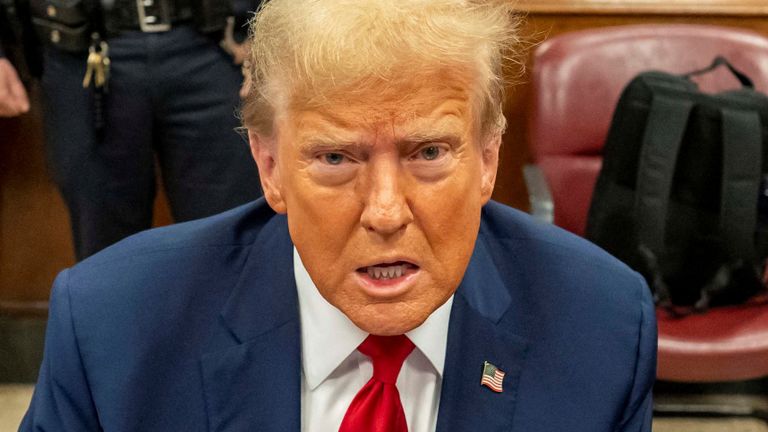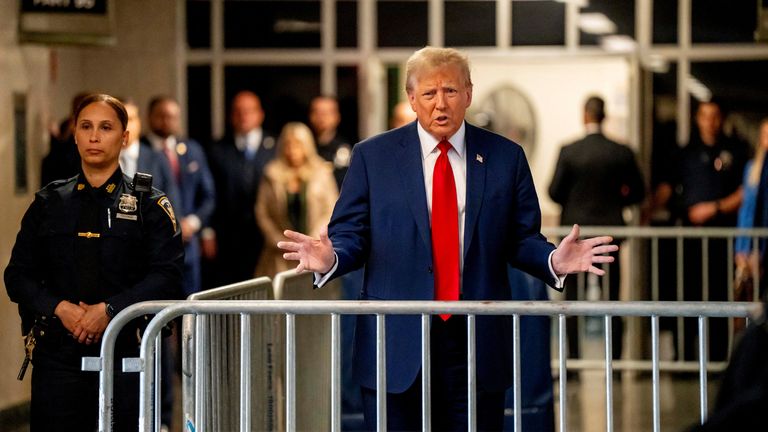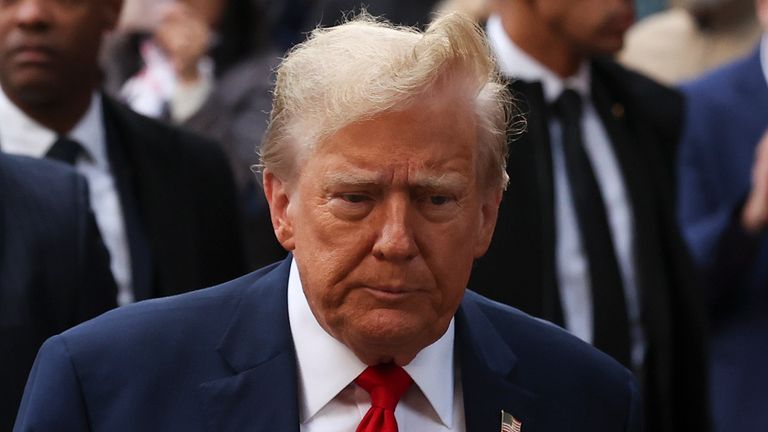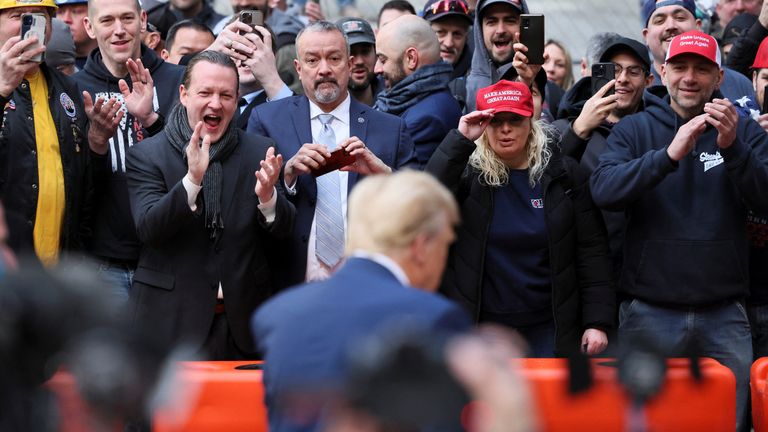Donald Trump managed a partial victory in the Supreme Court today, as justices delayed any potential decision on his immunity case over election riots.
Trump argued on Thursday he has total immunity over the 2020 riots and while justices in the Supreme Court were not convinced by his arguments, some raised the point he may have some level of immunity – and delayed any potential decision on that until June.
If they then rule the former president does have a level of immunity, it could kick the issue back into lower courts to decide what that level is, and knock back any potential decision to beyond the November election.
On Thursday, Trump, who made history as his country’s first ex-leader to face a criminal trial, was also fighting on two other separate legal fronts. They include:
• His hush money trial in New York where he is accused of falsifying business records after allegedly paying money to porn actress Stormy Daniels to “cover up an affair”.
• His defamation case, brought by writer E Jean Carroll – a judge rejected Trump’s attempt to throw out the verdict against him, leaving him facing an $83.3m (£66.5m) payout.
And adding to Trump’s legal woes, his former lawyers and associates were indicted on Wednesday in a 2020 election-related scheme in Arizona.
Follow latest: Trump’s hush money and Supreme Court trials
Analysis: Trump has won qualified victory at Supreme Court
Supreme Court
During proceedings, justices appeared likely to reject Trump’s claims of total immunity, but delayed any ruling to make a decision over what specific immunity he may or may not have.
Trump, 77, had even asked to skip his New York criminal proceedings to sit in on the Supreme Court’s special sessions.
In Washington, the lawyer representing the special counsel told the court it had never been previously recognised what kind of immunity Trump was actually seeking.
Chief justice John Roberts said he was concerned if presidents were not immune, the country would rely on “good faith” to prevent abusive prosecutions against presidents.
Read more from Sky News:
Harvey Weinstein’s 2020 rape conviction overturned
Dolphin found shot dead on beach
US considers cutting funds to notorious Israeli army unit
He told the special counsel’s lawyer, Michael Dreeben: “Now you know how easy it is in many cases for a prosecutor to get a grand jury to bring an indictment.
“And reliance on the good faith of the prosecutor may not be enough in some cases – I’m not suggesting here [Smith’s indictment of Trump].”
The Supreme Court is expected to release its opinions by the end of June over whether Trump has immunity or not.
With five justices appearing likely to reject Trump’s claims of absolute immunity, some suggested the former president may have some level of immunity.
If the eventual ruling reflects that, lower courts may be required to sort out the specifics of this – which could push any eventual decision past the November election.
Hush money
Meanwhile, in New York, Trump was once again present in Manhattan’s criminal court, accused of falsifying business records.
Earlier this week, the court heard from AMI, the former publisher of the National Enquirer, about an alleged “catch and kill” scheme, which was said to have been used to get rid of negative stories about Trump.
David Pecker, boss of AMI who signed a no-prosecution deal to testify, described shelling out hundreds of thousands of dollars to buy up rights to potentially damaging stories.
The National Enquirer, the court heard, bought up a sordid story from a New York City doorman as well as accusations of an extramarital affair with a former Playboy model to stop the claims getting out.
But Mr Pecker reached his breaking point with Stormy Daniels – a porn actress who was allegedly paid by Michael Cohen, Trump’s former lawyer, to keep quiet over her claims of a 2006 sexual encounter with Trump. Something he denies.
Mr Pecker told jurors his publication had been contacted by Ms Daniels’s representatives who said they could buy her story for $120,000 (£96,000) if it decided right away.
However, the publishing boss refused to. He told Mr Cohen: “I am not paying for this story. I didn’t want to be involved in this from the beginning.”
After that, a cross-examination of Mr Pecker began, with one of Trump’s lawyers, Emil Bove, taking centre stage.
Gag order
Hanging over Thursday’s hush money proceedings were allegations that Trump, once again, violated a gag order.
The order restricted Trump’s public speech regarding jurors, potential witnesses and some other individuals involved in the case.
Judge Juan Merchan was already considering whether to hold Trump in contempt and fine him for what prosecutors alleged were 10 separate violations of the order.
But on Thursday the prosecution ticked off fresh instances of alleged breaches.
These were additional remarks made about Mr Cohen, and a comment Trump made about the jury being “95% Democrats”, among other things.
But Trump was previously dismissive about the threat of having to pay up when speaking outside court, saying he had “no idea” whether he would be fined.
E Jean Carroll
While things may have went his way partly in the Supreme Court, a judge rejected Trump’s attempt to get a defamation verdict against him thrown out.
Writer E Jean Carroll said Trump defamed her after she accused him of raping her decades ago.
The court ordered Trump to pay $83.3m in damages, and on Thursday, US district judge Lewis Kaplan said Trump was not entitled to a new trial or judgement, so had to pay up.









Leave a Reply